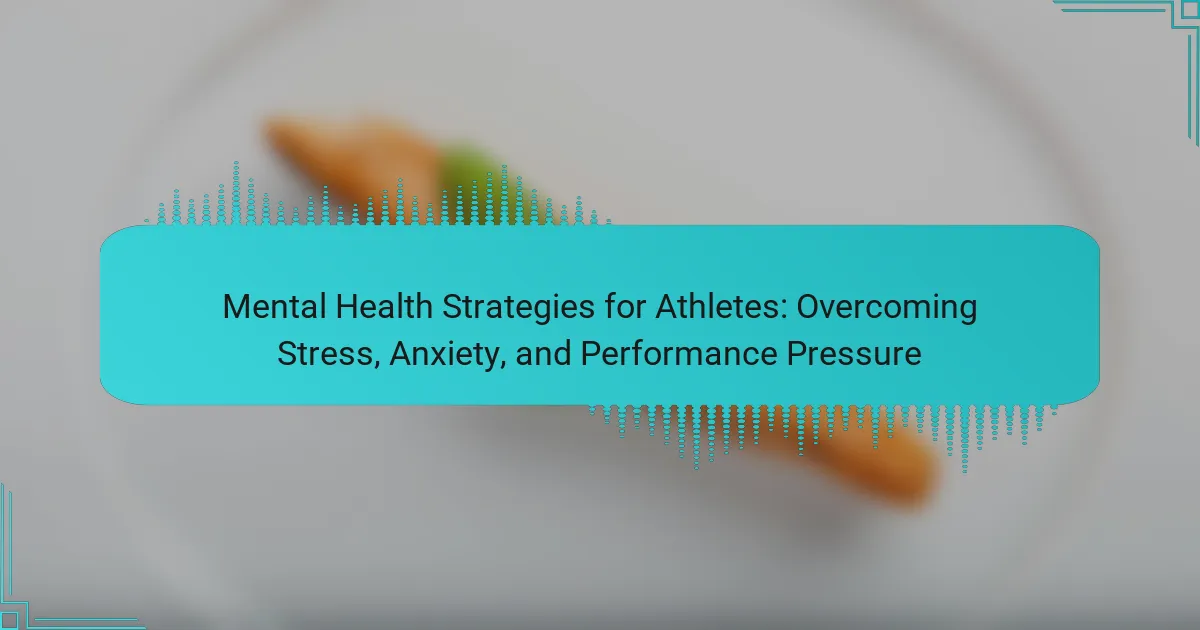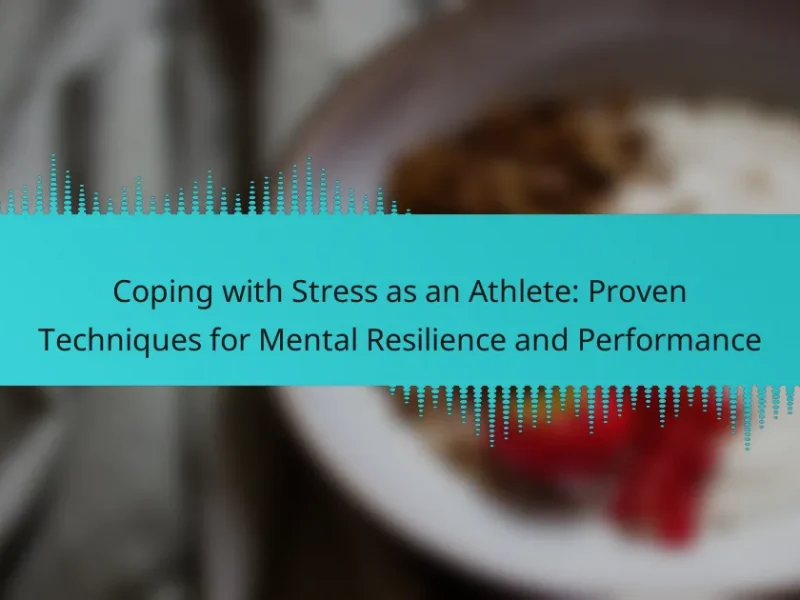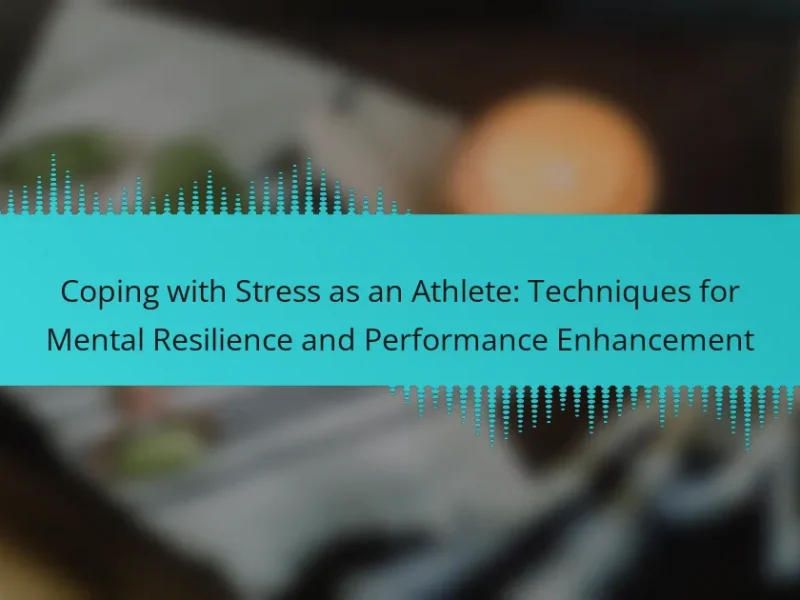Athletes often struggle with mental health challenges such as stress, anxiety, and performance pressure. Effective strategies include mindfulness techniques, cognitive-behavioral approaches, and building supportive networks. Common mistakes like neglecting mental health and underestimating external pressures can worsen these issues. Implementing best practices such as regular physical activity and open communication is crucial for maintaining mental well-being.

What are the mental health challenges athletes face?
Athletes face significant mental health challenges, including stress, anxiety, and performance pressure. These issues can stem from high expectations, intense competition, and the physical demands of their sport. Research indicates that approximately 33% of athletes experience anxiety disorders. Effective mental health strategies include mindfulness, cognitive-behavioral techniques, and supportive coaching environments. These approaches help athletes manage their mental well-being and improve performance.
How does stress impact athletic performance?
Stress negatively impacts athletic performance by impairing focus, increasing fatigue, and reducing motivation. High levels of stress can lead to anxiety, affecting decision-making during competitions. Athletes may experience decreased physical performance due to muscle tension and fatigue. Mental health strategies, such as mindfulness and breathing techniques, can help manage stress effectively, enhancing overall performance. Addressing stress is crucial for athletes aiming to maintain peak performance levels.
What role does anxiety play in sports?
Anxiety significantly impacts athletes by affecting their performance and mental well-being. It can lead to decreased focus, heightened stress, and impaired decision-making during competitions. Athletes often experience anxiety due to performance pressure, expectations, and fear of failure. Implementing mental health strategies, such as mindfulness and cognitive-behavioral techniques, can help athletes manage anxiety effectively. These strategies promote resilience and enhance overall performance, allowing athletes to thrive under pressure.
What performance pressures do athletes encounter?
Athletes encounter significant performance pressures that can impact their mental health. These pressures stem from expectations, competition intensity, and the fear of failure. Athletes often face external pressures from coaches, fans, and media, alongside internal pressures related to self-expectations and perfectionism. As a result, strategies such as mindfulness, cognitive-behavioral techniques, and support systems are essential for managing stress and anxiety. Implementing these mental health strategies can enhance performance and overall well-being.
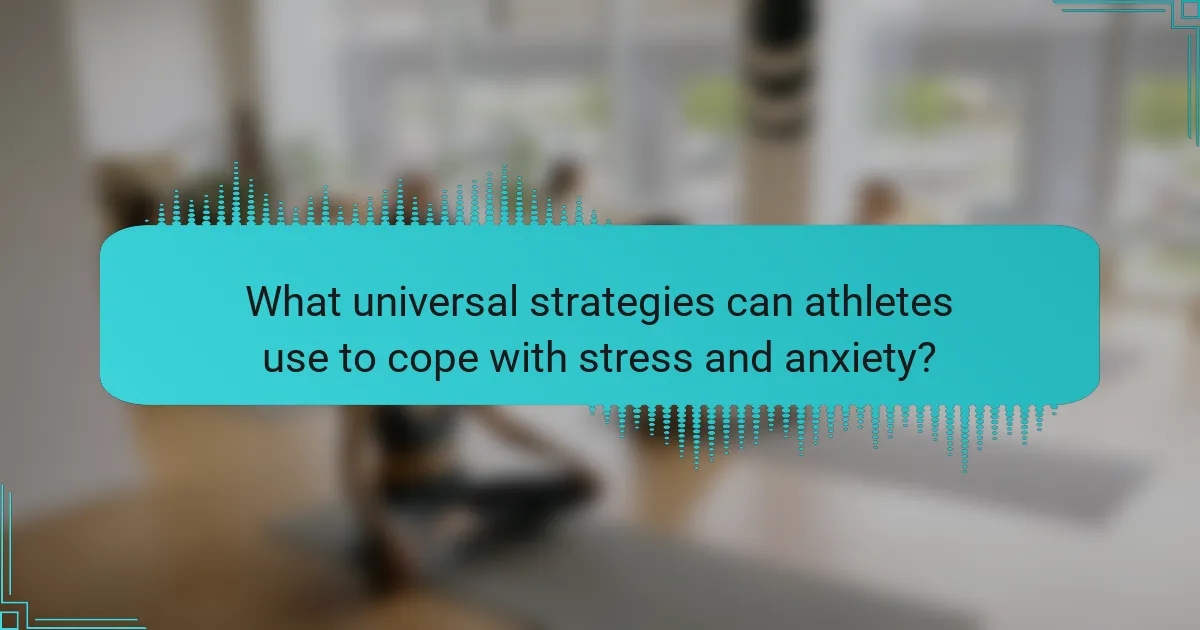
What universal strategies can athletes use to cope with stress and anxiety?
Athletes can effectively cope with stress and anxiety by employing universal strategies such as mindfulness, visualization, and structured routines. Mindfulness techniques, including meditation and deep breathing exercises, help athletes stay present and reduce anxiety. Visualization of successful performances enhances confidence and reduces stress levels. Establishing structured routines creates a sense of control, allowing athletes to focus on their performance rather than external pressures. These strategies foster mental resilience and improve overall well-being in high-pressure situations.
How can athletes develop effective coping mechanisms?
Athletes can develop effective coping mechanisms by practicing mindfulness, establishing routines, and seeking social support. Mindfulness techniques, such as meditation, help reduce anxiety and enhance focus. Structured routines provide a sense of control and predictability, which can alleviate performance pressure. Engaging with teammates or coaches fosters a supportive environment, promoting emotional resilience. Additionally, cognitive-behavioral strategies can help athletes reframe negative thoughts, improving their overall mental health.
What are the benefits of physical activity for mental health?
Physical activity significantly enhances mental health by reducing stress, anxiety, and depression. Regular exercise releases endorphins, improving mood and overall well-being.
Engaging in physical activity can lead to better sleep quality, which is crucial for mental health. Studies show that athletes often experience lower levels of anxiety and improved self-esteem due to their active lifestyle.
Moreover, exercise serves as a coping mechanism for performance pressure, helping athletes manage stress effectively. The social aspect of team sports also fosters a sense of community, further supporting mental health.
In summary, the benefits of physical activity for mental health include mood enhancement, stress reduction, improved sleep, and stronger social connections.
How does proper nutrition support mental well-being?
Proper nutrition significantly enhances mental well-being by providing essential nutrients that support brain function. Nutrients like omega-3 fatty acids, vitamins, and minerals play a crucial role in reducing stress and anxiety. For athletes, a balanced diet can improve mood and cognitive performance, enabling better focus during competitions. Studies show that adequate nutrition correlates with lower levels of depression and anxiety in athletes, highlighting its importance in mental health strategies.
What role does sleep play in managing stress?
Sleep is crucial for managing stress as it restores mental and physical health. Adequate sleep enhances mood, improves cognitive function, and reduces anxiety. Athletes, in particular, benefit from sleep’s restorative qualities, leading to better performance and resilience against stress. Research indicates that sleep deprivation can heighten stress levels and impair decision-making, affecting athletic performance. Prioritizing sleep can thus be a unique strategy for athletes to effectively manage stress and maintain peak performance.

What unique mental health strategies are available for athletes?
Athletes can utilize unique mental health strategies such as mindfulness training, cognitive behavioral techniques, and support networks to manage stress, anxiety, and performance pressure. Mindfulness training enhances focus and emotional regulation, allowing athletes to remain present during competition. Cognitive behavioral techniques help reshape negative thought patterns, fostering resilience. Building support networks provides emotional backing and shared experiences, reducing feelings of isolation. These strategies empower athletes to maintain mental well-being while navigating the challenges of their sport.
How can visualization techniques enhance performance confidence?
Visualization techniques can significantly enhance performance confidence in athletes by creating mental images of success. These techniques help athletes mentally rehearse their performance, reducing anxiety and improving focus. Research shows that visualization can activate the same neural pathways as actual performance, leading to better execution during competition. As a result, athletes who regularly practice visualization report increased self-efficacy and a stronger belief in their abilities. This unique attribute of visualization makes it a powerful tool for overcoming stress and performance pressure.
What is the role of sports psychology in mental health?
Sports psychology plays a crucial role in enhancing mental health for athletes by equipping them with strategies to manage stress, anxiety, and performance pressure. Techniques such as visualization, mindfulness, and cognitive restructuring help athletes develop resilience and maintain focus during competitions. Research indicates that athletes who engage with sports psychologists experience lower levels of anxiety and improved performance outcomes. Additionally, the unique attribute of tailored mental health strategies addresses individual needs, fostering a supportive environment for athletes to thrive.
How do team dynamics influence mental health?
Team dynamics significantly influence mental health by affecting stress levels and overall well-being. Positive team interactions can enhance emotional support, reducing anxiety and fostering resilience. Conversely, negative dynamics can exacerbate performance pressure, leading to burnout and mental distress. Research shows that athletes in supportive teams report lower levels of stress and greater satisfaction (Smith et al., 2022). Implementing strategies that promote cohesion and open communication can mitigate these risks, ultimately improving mental health outcomes for athletes.

What rare but effective techniques can athletes explore?
Athletes can explore rare techniques like visualization, mindfulness, and biofeedback to enhance mental health. Visualization involves mentally rehearsing performance scenarios, which can reduce anxiety and improve focus. Mindfulness practices, such as meditation, help athletes stay present, managing stress effectively. Biofeedback uses technology to provide real-time data on physiological functions, allowing athletes to learn self-regulation techniques. These methods are not commonly adopted but can lead to significant improvements in mental resilience and performance under pressure.
How can biofeedback be used to manage anxiety?
Biofeedback can effectively manage anxiety by providing real-time data on physiological functions. This technique allows athletes to learn how to control their body’s responses to stress, leading to reduced anxiety levels.
Through biofeedback, individuals can monitor heart rate, muscle tension, and breathing patterns. By recognizing these signals, athletes can implement relaxation techniques such as deep breathing or progressive muscle relaxation. As a result, this practice enhances mental resilience and performance under pressure.
Studies indicate that biofeedback can significantly lower anxiety symptoms in athletes, improving overall mental health. This unique approach empowers athletes to take control of their anxiety, fostering a proactive mindset in competitive environments.
What is the impact of artistic expression on athlete mental health?
Artistic expression significantly enhances athlete mental health by providing an emotional outlet. Engaging in creative activities reduces stress, alleviates anxiety, and helps manage performance pressure. Research indicates that athletes who participate in artistic endeavors report improved mood and mental resilience. This unique attribute of artistic expression fosters a sense of identity and belonging, which is crucial for mental well-being. Athletes can benefit from incorporating artistic practices into their training routines to cultivate a balanced mindset.
How can nature therapy benefit athletes?
Nature therapy can significantly benefit athletes by reducing stress and anxiety. Engaging with natural environments enhances mental clarity and emotional resilience. Studies show that spending time in nature lowers cortisol levels, promoting relaxation. Additionally, nature therapy fosters a sense of connection and well-being, which can improve overall performance. Regular exposure to green spaces may also lead to unique benefits, such as increased focus and motivation, essential for athletes facing performance pressure.
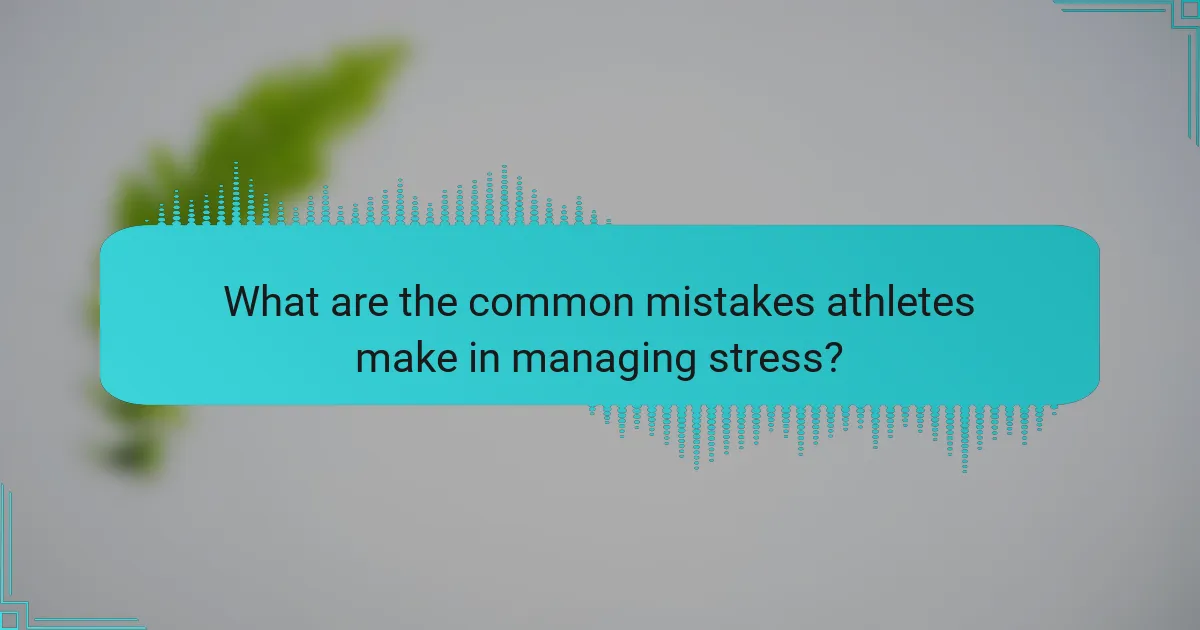
What are the common mistakes athletes make in managing stress?
Athletes often make several common mistakes in managing stress, including neglecting mental health, failing to communicate feelings, and relying solely on physical training. These oversights can exacerbate anxiety and hinder performance.
One significant error is the lack of effective coping strategies. Many athletes do not practice mindfulness or relaxation techniques, which can lead to increased stress levels. Additionally, some athletes avoid seeking professional help, believing they can manage stress alone.
Another mistake is underestimating the impact of external pressures, such as competition and expectations. This can create a cycle of stress that affects both mental and physical performance. Athletes may also struggle with time management, leading to overwhelming workloads and heightened anxiety.
Lastly, ignoring the importance of social support can be detrimental. Athletes who do not engage with teammates or coaches may feel isolated, compounding their stress. Recognizing and addressing these mistakes is essential for improving mental health and overall athletic performance.
What are the signs that an athlete needs professional help?
Athletes may need professional help if they exhibit signs of chronic stress, persistent anxiety, or significant performance pressure. Indicators include withdrawal from social interactions, changes in sleep patterns, decreased performance, and emotional instability. Recognizing these signs early is crucial for effective intervention.
How can athletes create a support network?
Athletes can create a support network by connecting with teammates, coaches, and mental health professionals. This network provides emotional resilience and coping strategies. Engaging in regular communication fosters trust and understanding. Additionally, participating in group activities can strengthen these relationships. A unique attribute of a strong support network is its ability to enhance mental well-being, reducing stress and anxiety.

What best practices can athletes implement for ongoing mental health?
Athletes can implement several best practices for ongoing mental health, including mindfulness, regular physical activity, and seeking professional support. Mindfulness techniques, such as meditation, help reduce stress and anxiety. Engaging in regular physical activity not only boosts mood but also improves overall mental resilience. Additionally, maintaining open communication with coaches and teammates fosters a supportive environment. Setting realistic goals and practicing positive self-talk further enhances mental well-being. Prioritizing sleep and nutrition also plays a crucial role in mental health maintenance.
How can athletes maintain a balanced lifestyle?
Athletes can maintain a balanced lifestyle by prioritizing mental health strategies. These include practicing mindfulness, setting realistic goals, and engaging in regular physical activity. Mindfulness techniques, such as meditation, reduce stress and enhance focus. Setting achievable goals prevents burnout and fosters motivation. Regular physical activity, beyond training, promotes overall well-being. Incorporating social support from teammates and coaches also plays a crucial role in managing performance pressure. These strategies collectively enhance resilience against stress and anxiety, essential for athletes’ mental health.
What are the key takeaways for managing stress and anxiety effectively?
To manage stress and anxiety effectively, athletes should prioritize mental health strategies. Key takeaways include practicing mindfulness, establishing a routine, utilizing visualization techniques, and seeking social support. Mindfulness helps in staying present, reducing anxiety. A consistent routine fosters stability, while visualization enhances performance confidence. Social support provides emotional resilience, crucial for overcoming pressure.
